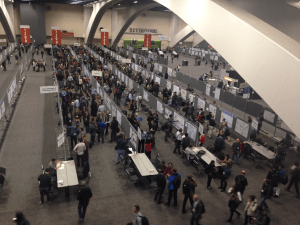Evidence that human activity is behind the Dallas quakes includes a new analysis showing that the faults beneath Dallas and Fort Worth had been dormant for hundreds of millions of years until 2008.

Science journalist Anna Kuchment with The Dallas Morning News covered the comments of SMU seismologists Heather DeShon and Beatrice Magnani speaking during the annual American Geophysical Union meeting in San Francisco, Calif. DeShon and Magnani presented their latest research on North Texas ground shaking.
The SMU seismology team, which includes DeShon and Magnani, published new evidence of human involvement in earthquakes in Nature Communications in April 2015. Their data showed that large volumes of wastewater injection combined with saltwater (brine) extraction from natural gas wells is the most likely cause of earthquakes near Azle, Texas, from late 2013 through spring 2014.
The Dallas Morning News article published Dec. 16, 2015.
EXCERPT:
By Anna Kuchment
The Dallas Morning News
Scientists presented new evidence this week suggesting that all five North Texas earthquake sequences, including those in Dallas, have been triggered by humans.Until now, researchers have not commented on the cause of the Dallas-Irving quakes or the 4-magnitude quake that struck Venus, 30 miles south of Dallas, in May.
While scientists believe that high-volume injection wells may have triggered the quakes in Venus, they have not yet worked out a specific mechanism behind the Dallas and Irving quakes.
“We don’t think they’re natural,” SMU seismologist Heather DeShon told The Dallas Morning News. “But we don’t understand the subsurface physics surrounding the Irving earthquake sequence, so we’re still considering all causes.”
DeShon’s comments came during the annual American Geophysical Union meeting in San Francisco, where she and her colleagues presented their latest research on North Texas ground shaking. The research has not yet been independently vetted and published.
“Any discussion of causation for the Dallas-area quakes is premature, and more speculative than scientific,” said Steve Everley, a senior advisor for Energy In Depth, a program of the Independent Petroleum Association of America. “But the SMU team has helped advance our understanding of the conditions that can ultimately lead to induced seismicity, so we’re eager to see what they will publish about the seismic events near Dallas.”
Follow SMUResearch.com on twitter at @smuresearch.
SMU is a nationally ranked private university in Dallas founded 100 years ago. Today, SMU enrolls nearly 11,000 students who benefit from the academic opportunities and international reach of seven degree-granting schools. For more information see www.smu.edu.
SMU has an uplink facility located on campus for live TV, radio, or online interviews. To speak with an SMU expert or book an SMU guest in the studio, call SMU News & Communications at 214-768-7650.


 California 6th grade science books: Climate change a matter of opinion not scientific fact
California 6th grade science books: Climate change a matter of opinion not scientific fact Reading ability soars if young struggling readers get school’s intensive help immediately
Reading ability soars if young struggling readers get school’s intensive help immediately